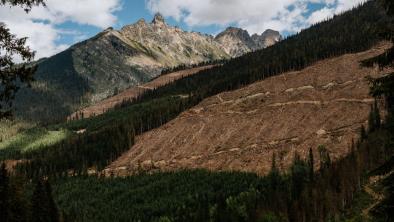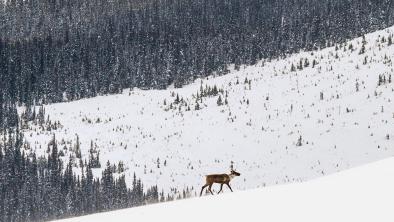Wild salmon advocates cheer Cohen Commission report
The Tyee

NDP's Donnelly, Alexandra Morton, farmers and more weigh in on 75 recommendations to protect the fish.
Supporters of B.C.'s wild salmon were delighted with the release of the Cohen Commission report on Oct. 31, but stressed that it's now up to citizens to put pressure on federal and provincial politicians to ensure that Cohen's recommendations are carried out.
The report, in three large volumes and almost 1,200 pages, was made available for download as Justice Cohen began speaking at a media conference on Wednesday afternoon. In his low-key presentation, Cohen was quick to dismiss the idea of a single "smoking gun" as the cause of the decline of the Fraser sockeye. Instead, he raised many major issues as factors, ranging from conflict of interest in the Department of Fisheries and Oceans, to the impact of climate change, to Ottawa's weakening of protection for sockeye in Bill C-38.
Those issues have inspired 75 specific recommendations, expressed dispassionately but with dramatic implications for the management of both wild and farm salmon.
"In relation to wild fisheries," Cohen said in recommendation #2, "the Department of Fisheries and Oceans should act in accordance with its paramount regulatory objective to conserve wild fish." He explicitly pointed out DFO's conflict of interest in also promoting farmed salmon, and said some other agency should take on that task.
Cohen also set out specifics about a "wild salmon policy implementation plan," with dedicated funding sufficient to carry it out; the plan should be published, he said, by March 31, 2013 -- just five months from now.
Discovery Islands' fish farms cap
Cohen also recommended a cap on fish farms in the Discovery Islands, with no increases in production in existing farms and a one-year maximum for licenses. In addition, licenses would require farm operators to provide as many fish samples as DFO requires for both monitoring and research. These and other regulations, Cohen said, should begin immediately and run until at least Sept. 30, 2020.
"If at any time between now and Sept. 30, 2020," Cohen wrote, "the minister of fisheries and oceans determines that net-pen salmon farms in the Discovery Islands (fish health sub-zone 3-2) pose more than a minimal risk of serious harm to the health of migrating Fraser River sockeye salmon, he or she should promptly order that those salmon farms cease operations."
He went on to say: "On Sept. 30, 2020, the minister of fisheries and oceans should prohibit net-pen salmon farming in the Discovery Islands... unless he or she is satisfied that such farms pose at most a minimal risk of serious harm to the health of migrating Fraser River sockeye."
Many of Cohen's recommendations deal with ongoing and increasing research and monitoring of fish and habitat, and with complete implementation of the 1986 Habitat Policy. He set March 31, 2013 as the deadline for DFO to set out a detailed plan on achieving such implementation. He also called for creation of an independent body to report on implementation of the policy, with its first report to be delivered by March 31, 2014.
NDP: 'A legacy of Conservative mismanagement'
Wild salmon advocates were generally happy with the commission's findings. Fin Donnelly, NDP MP for New Westminster-Coquitlam and Port Moody, praised the report while condemning a "legacy of Conservative mismanagement." While the commission hearings were under way, he said, "The Conservative government dismantled environmental regulations during the last two years, making deep cuts to DFO, all before hearing the recommendations of this commission."
Donnelly told The Tyee the most under-reported aspects of the wild salmon issue include the impact of climate change and changing ocean conditions.
"It's a critical issue, but it's hard to tackle because it's overwhelming."
He also called attention to habitat loss: "We need an ecosystem-based approach, but the Conservatives walked away from it and gave us a very narrow definition of 'fishery.' They're fast-tracking their pipeline agenda instead."
'Astonishing' report: Morton
Biologist and wild-salmon advocate Alexandra Morton told The Tyee she was "very happy" with what she called an "astonishing" report. She pointed out that Cohen had recommended relieving DFO of fish-farm promotion, and had recognized that fish farms can introduce diseases.
Morton also praised Cohen's recommendations for revising farm-siting criteria, and especially the freeze on farm expansion until 2020, and for reopening the commission to study evidence for viruses in wild and farmed fish.
She pointed out that B.C. is now reviewing renewal of fish-farm licenses. "In the light of Cohen, Fraser River First Nations need to be consulted right now before licenses are granted," she said. Morton noted that B.C. "completely ignored migration patterns" in siting fish farms.
"It's time for the industry to get up and run out of here," Morton said, adding that it was also time for individuals to step up and tell their MPs that "wild salmon are important." She urged the public to put pressure on B.C. MLAs not to renew fish farm licenses and to consult with First Nations.
In a news release from the Union of British Columbia Indian Chiefs, Chief Bob Chamberlin of Kwicksutaineuk/Ak-Kwa-Mish Tribes said: "Commissioner Cohen made 75 recommendations with respect to the protection and conservation of wild salmon and the UBCIC calls on the Federal Government to make the necessary investments in the protection of wild salmon on par with the money invested into the aquaculture industry."
In the same release, UBCIC president Grand Chief Stewart Phillip said: "Harper's agenda is clear, through recent omnibus legislation... the Harper Government has effectively eviscerated the Fisheries Act. The Harper Government cannot ignore this call by Justice Cohen, First Nations and others to ensure the sustainability of the fishery."
Wild salmon 'critically important': farmers association
Stewart Hawthorn, a member of the board of the B.C. Salmon Farmers Association, said "We're very happy with Justice Cohen's praise of the quality and quantity of our data," adding that "He didn't ask us to stop farming, just to do more research, which we're happy to do."
Hawthorn pointed out that the report dealt largely with the Discovery Islands: "This is a small region, and he didn't mention all fish farms as a concern." He said the health of wild salmon is "critically important" to his industry.
Hawthorn's comments were echoed in a BCSFA news release issued this afternoon, which also quoted another board member, Clare Backman: "Our members are committed to farming responsibly -- and that commitment will continue as we move forward in light of these recommendations. It’s important that we continue with the important social and economic role we play in the coastal communities of BC while protecting our natural environment."
Dr. Craig Orr, executive director of the Watershed Watch Salmon Society, told The Tyee: "The report could have been stronger -- it could have called for removal of salmon farms from migration routes." Still, he expressed satisfaction with Cohen's recommendation for full implementation of the 1986 Habitat Policy, and for his proposal that DFO appoint a dedicated person to champion wild salmon.
"I've been in so many reviews," Orr said, "and this is the most complete review of the issues, with the strongest recommendations."
Meanwhile, the Wilderness Committee gave the Cohen Commission "a solid B" on its report. In a news release, it quoted policy director Gwen Barlee as saying: "What remains to be seen is if the federal government will actually implement Justice Cohen's recommendations."


